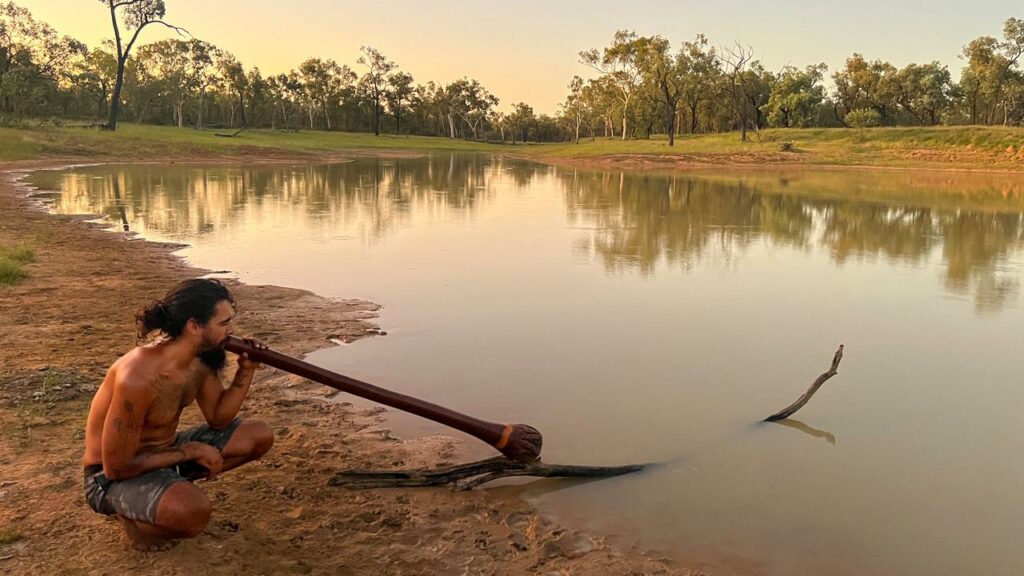Traditional custodians vow to keep fighting mine
Rudi Maxwell |

At the same time as Prime Minister Anthony Albanese was leading a delegation to India, a lone traditional owner had a message from his homelands in central Queensland.
“Stand up and fight back,” Coedie McAvoy told the people of India.
Mr McAvoy was speaking from Waddananggu, where the Wangan and Jagalingou man has been living in the shadow of the Carmichael coalmine for the past 18 months.
Mr McAvoy and his father Adrian Burragubba have been fighting back against mining operations by Indian company Adani and its Australian subsidiary Bravus for more than a decade.
The fight has cost them dearly.
It has seen family members disagree so bitterly that it’s caused rifts that are unlikely to heal for years.
But both men have vowed to keep going because, to them, country means everything.
“It’s destroyed my life,” Mr Burragubba told AAP.
“I was bankrupted. I couldn’t even rent a house.
“But everything I fought for was to go back to country, where my son Coedie is, so our family can enjoy the country of our ancestors.”
The Carmichael coalmine is in the Galilee basin.
From the moment Adani proposed mining coal on Wangan and Jagalingou country, there was division between traditional owners.
Some wanted to do a deal with the mining company for money, jobs and business contracts.
Others were strongly opposed to any mining.
Between 2012 and March 2016, Wangan and Jagalingou people held three meetings to discuss signing an Indigenous land use agreement with Adani.
It was voted down all three times.
Another meeting, convened in Maryborough in April 2016, recorded a 294 to one vote in favour of a land use agreement.
Members of the native title claim group who boycotted this meeting say it was stacked with people who didn’t have a right to vote and it should not have been authorised.
However, it was authorised and has survived legal challenges since.
At the moment, Adani is facing battles on several fronts.
Shares in the Adani Group, which also has interests in cement, food processing and weapons manufacturing, have fallen since US-based activist short-seller Hindenburg Research alleged stock manipulation and improper use of tax havens.
Adani denies the allegations.
News agency Al Jazeera reported last week the Indian government granted the Adani Group an exception to a Supreme Court ruling regarding the way mining contracts were awarded.
Adani has benefited from government action in Australia.
In 2017, the federal coalition government, supported by Labor, amended the Native Title Act so a majority of named claimants could sign an Indigenous land use agreement, whereas previously the act had required agreement to be unanimous.
Then in 2019 the Queensland Labor government extinguished native title over 1385 hectares of Wangan and Jagalingou land without any public announcement, paving the way for the mine.
That act by the state also thawed relations between formerly feuding traditional owners, who joined together to fight the decision in court.
Patrick Malone, one of the traditional owners who was in favour of the land use agreement for the mine and who had been at odds with Mr Burragubba, said at the time it was a very difficult situation.
“We’re all on the same page and we want the same outcome … recognition of our native title and our native title rights,” he said.
In a statement provided to AAP, a spokesman for Bravus defended its mining operations but did not answer a series of questions.
As it stands, the situation is at a stalemate – Bravus is still mining, but has accepted Mr McAvoy is allowed to camp, as long as he doesn’t impede the mine’s operation.
But the company has continued to aggressively campaign against him, claiming the “unauthorised protest camp on our mining lease was organised and bankrolled by the anti-fossil fuel lobby” and has alleged Mr McAvoy assaulted a company employee.
Mr McAvoy, for his part, says he’s not on the mining lease, he’s on the pastoral lease – and the Queensland Human Rights Act allows him to camp and practise his culture.
He also denies assaulting anyone.
“I’m asserting my ancestral rights,” Mr McAvoy said.
“I can tell you the stories of the rivers and mountains – and that’s how I can tell you it’s our country.
“They are trying to build this narrative to say I’m a violent person. I’m a peaceful person.
“My old people told me in 2019 to go and fight for country, so regardless what other people think, this is the right thing to do and I have approval.”
Mr Burragubba wants people to know they are not protestors or part of the environmental activist movement, although there are some overlapping aims.
“We’re not greenies – it’s our country and we’re not asking anyone permission to enter our own country,” he said.
“What can we do? We’re Aboriginal people trying get back country, with a company worth billions trying to to stop us.”
Traditional owners’ rights have been extinguished in the Australian legal system but Mr McAvoy and Mr Burragubba are refusing to acknowledge laws they say don’t have authority over them.
“Sovereignty never ceded” is one of the catchcries of the Indigenous land rights movement.
And what that looks like in practice is Mr McAvoy playing his didge, over the waters of his ancestors, while a mining company legally digs up his country for coal.
“It’s our human right to be Aboriginal and people from the land and we want to be respected as people from our country,” Mr Burragubba said.
“We should be allowed to carry on with our spiritual practice however we see fit without interruption.”
AAP